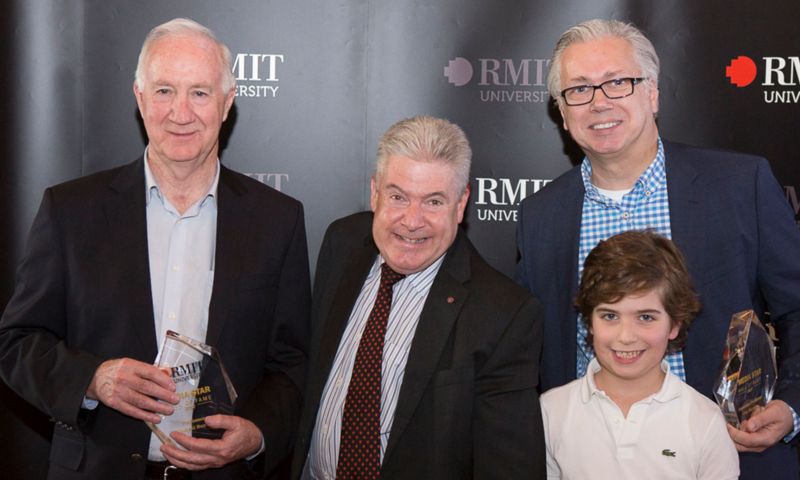Professor Constantino (Con) Stavros
Deputy Dean, Learning & Teaching


COBL | School of Economics Finance & Marketing
Consumer Wellbeing Research Group
Email: con.stavros@rmit.edu.au
Phone: +61 3 9925 5531
Campus: Melbourne City

COBL | Economics Finance & Marketing
Consumer Wellbeing Research Group
Email: con.stavros@rmit.edu.au
Phone: +61 3 9925 5531
Campus: Melbourne City
Professor Stavros’ leadership and innovation have been at the forefront of numerous major initiatives at RMIT, including the offering of marketing degrees with international partners and the introduction of online postgraduate study. An accomplished academic whose work adroitly connects theory to practice, Professor Stavros has received widespread recognition for his teaching, research and contributions to community and industry engagement. He is currently the Deputy Dean, Learning & Teaching in the School of Economics, Finance & Marketing, and was formerly the Head of Department for Marketing.
He possesses a global understanding of contemporary marketing practice, particularly in the application of strategic concepts in communication and the development and function of marketing both through, and of, sport. His research interests lie predominantly at the intersection of consumption and technology, and he has published books, book chapters and journal articles across a range of fields. His work on a variety of topics from athlete transgressions to consumer engagement via social media have proven to be hallmarks of business development and understanding. He has been a Chief Investigator on many externally funded grants that have considered social impact and consumer behaviour, including with bodies such as VicHealth, the Foundation for Alcohol Research & Education (FARE), the Alcohol & Drug Foundation (ADF), and the Australian Securities & Investments Commission (ASIC). Professor Stavros was Editor-in-Chief of the international journal Sport, Business & Management between 2015 and 2020.
As one of Australia’s foremost commentators on marketing matters he features in the media on a regular basis. In 2017 he was an inaugural inductee in the RMIT media ‘Hall of Fame’ and is the only person to have won the university’s ‘Overall Media Star’ award on multiple occasions. Professor Stavros is often sought out by industry to provide guidance on issues relating to branding and marketing; including as an expert witness in matters before the Federal Court of Australia.
Over a lengthy academic career at RMIT, Professor Stavros has also earned international acclaim for his scholarship and is a Visiting Professor at the renowned IESEG School of Management (France) and a Visiting Fellow at Loughborough University London (UK) as part of one of the world’s leading institutes for the study of sport business. He has a strong passion for teaching and education practice and has received numerous commendations for his contemporary approach, including awards at School, College and University level. His most recent teaching encompasses units in Marketing Communication Strategy and in Sport Marketing, although he has extensive experience across a range of marketing offerings including at undergraduate, postgraduate and executive level. Aside from Australia, Dr Stavros has taught extensively in Asia and Europe and is a Fellow of the Higher Education Academy (UK).

Professor Stavros has provided services to a wide range of commercial brands and has also aided community and government sectors on a variety of projects ranging from strategic planning to expert opinion. Given his prominence as a marketing commentator, he regularly provides the media with insight on related business topics, including as the long-standing ‘Program Marketing Expert’ on Radio 3AW’s top-rating Morning show with Neil Mitchell.
He authored a thought-leadership column in one of Australia’s leading industry publications, Marketing magazine, from 2005 to 2020 when the magazine ceased production. He remains committed to sharing insight, promoting the scholarship of marketing, and empowering the discipline given its business, social and cultural significance.

Professor Stavros' research reflects a strong interest in contemporary marketing communications, media and branding strategy, the business and marketing of sport, and the application of social marketing with regard ensuring consumer wellbeing.
Marketing Communication and Strategy, Branding and Advertising, Relationship Marketing, Social Marketing, Qualitative Research Methods
Publications
Grants
Awards

Professor Stavros has supervised a range of higher degree research students, including topics in word-of-mouth, online brand communities, athlete assessment and recruitment, and consumer behaviour. He is particularly interested in students who adopt qualitative methodologies to develop understanding that can enrich consumers and their communities, or which helps spotlight the marketing practices that will generate positive social impact in the future. He is also interested in transformative media practices and the presumptive change this will have on viewing and engagement, as well as the business and marketing of sport more generally.
Journal of Services Marketing
Stavros, C., Westberg K., Russell, R., & Banks, M. (2021).
European Sport Management Quarterly
Stavros, C., Smith, A. & Lopez-Gonzalez, H.(2021).
Sport Management Review, 17, 455– 469.
Stavros, C., Meng M., Westberg K. & Farrelly, F. (2014).

VicHealth
Team: Westberg K., Parker L., Reid M., Martin D., Fouvy D., Worsley T. & Druce A.
2019-21
Foundation for Alcohol Research and Education (FARE)
Team: Westberg, K. & Newton, F.
2019
Australian Securities and Investments Corporation (ASIC)
Team: Russell, R., Westberg K., & Banks M
2018-19


Award date: 2018
Recipients: Con Stavros
Award date: 2017
Recipients: Con Stavros
Award date: 2013
“Sustained excellence in student-centred teaching practice aligned with industry engagement, innovation and practical applications of knowledge in the field of Marketing”
Recipients: Con Stavros


Professor Stavros is one of Australia's foremost commentators on marketing and branding matters and has appeared across a wide spectrum of media outlets for over two decades. In 2017 he was an inaugural inductee into the RMIT Media Hall of Fame in recognition of his distinguished service to media engagement.

Acknowledgement of Country
RMIT University acknowledges the people of the Woi wurrung and Boon wurrung language groups of the eastern Kulin Nation on whose unceded lands we conduct the business of the University. RMIT University respectfully acknowledges their Ancestors and Elders, past and present. RMIT also acknowledges the Traditional Custodians and their Ancestors of the lands and waters across Australia where we conduct our business - Artwork 'Sentient' by Hollie Johnson, Gunaikurnai and Monero Ngarigo.
Acknowledgement of Country
RMIT University acknowledges the people of the Woi wurrung and Boon wurrung language groups of the eastern Kulin Nation on whose unceded lands we conduct the business of the University. RMIT University respectfully acknowledges their Ancestors and Elders, past and present. RMIT also acknowledges the Traditional Custodians and their Ancestors of the lands and waters across Australia where we conduct our business.